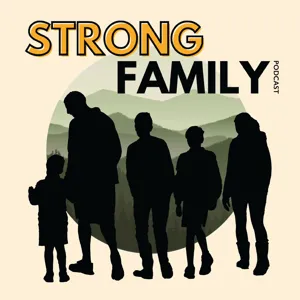Marisa Franco, author of Platonic, discusses how society devalues friendship in favor of romantic relationships—and the power of re-prioritizing friendship. Plus, how to turn a stranger into a friend, and harness emotional management for healthier, more meaningful companionship.
Bonfire Digital Wellness has a diverse team of seasoned, compassionate school counselors, ready to coach your teen. Check it out today and take advantage of a 1-month FREE trial: BonfireDW.org/talkingtoteens
Full show notes
We often place our romantic relationships above all else–just look how many new dating apps are invented every year! We pledge to love each other until death does us part, assuming that our perfect soulmate might be the only person we’ll ever need. And although love, marriage and the baby carriage can bring us plenty of joy, we sometimes forget about a tried-and-true source of support and kindness–friendship.
Unfortunately, we often treat friendship as secondary, when we should be doing the opposite. Our friendships tend to outlast those romantic relationships…even when we thought that love was forever. Plus, having strong friendships has been linked to higher self-esteem, greater levels of empathy, and an overall increase in quality of life. This especially true for teens, who are still learning how to forge strong relationships of all kinds.
So how can we encourage teens to make more friends? We’re asking Marisa Franco, author of Platonic: How the Science of Attachment Can Help You Make—and Keep—Friends. Marisa is a professor at the University of Maryland who writes regularly for Psychology Today. She’s also been featured in media outlets like the New York Times, NPR, and Good Morning America!
In our interview, Marisa and I are talking about why our culture stopped valuing friendship–and why we need to start prioritizing our friends again. We also discuss tips and tricks for making new friends, and how traits like authenticity and vulnerability can lead to deeper, more satisfying friendships.
Why Friendship is Powerful
When two people become romantically linked, we typically describe them as being “more than friends.” This implies that romantic love is at the top of the hierarchy, and often reinforces the idea that romantic or sexual love is the only kind of love that makes us “worthy,” says Marisa.
But friendship can be an incredible and bountiful form of love, and one we shouldn’t neglect, she explains. In the episode, we discuss why platonic love became stigmatized as homophobia grew in society, until romantic love became the only acceptable alternative.
Marisa explains that friendship also has benefits beyond just giving us someone to talk to. Having friendships in childhood and adolescence has been linked to higher levels of empathy, morality, and self consciousness in adult life. Companionship with others helps teens expand their understanding of the world and pick up new interests and hobbies. Making a friend who likes to golf might encourage teens to try golfing–and the same goes for skiing, chess, or any other activity!
Friends can also increase teens’ feelings of safety and security, even when it comes to physical threats, Marisa explains. Researchers found that when people have friends nearby, they describe possible dangers–like an impending shooter or even a steep hill–as significantly less frightening.
This can be a double-edged sword for teenagers, however, as being with a group of peers can embolden them to partake in certain risky behaviors. In the episode, Marisa and I explain how teens can harness the power of friendship for good instead of getting into trouble.
Having friends is great, but some teens have trouble getting to know their peers. In our interview, Marisa shares some great advice for teens who are struggling to connect with others.
The Art of Making Friends
We typically don’t try to “force” friendships with strangers…we’d prefer it to just happen naturally! But very few friendships actually happen naturally, Marisa says. Most of the time, one or both parties have to be intentional about creating the friendship, as well as maintaining it.
Oftentimes, there’s one person within a group who initiates friendships with the others, a person whom Marisa calls “the igniter.” Marisa explains that we should encourage teens to be igniters, and create new friendships wherever they can. Not only will this lead them to have a wider circle, but it gives them the chance to control the dynamic of their social settings by being the “connector.”
Step one is usually talking to strangers, however, something most of us would rather avoid doing. Marisa encourages teens, adults, and everyone in between to approach strangers for a conversation, and simply assume that people will respond positively! In the episode, she breaks down some research that indicates that those who assume they’ll be liked by strangers come across much more confident and have a higher chance of making friends.
We also tend to bond with people to whom we are repeatedly exposed, says Marisa. School, work and hobbies are where most people form connections to others, simple from just being around one another. For this reason, Marisa encourages us to sign our kids up for plenty of extracurriculars, so that they’re in the same room with certain peers over and over.
Making friends is one thing, but keeping them is another! In the episode, Marisa is explaining how we can form stronger, more durable bonds by being vulnerable and authentic.
Forging Stronger Friendships
If we want sturdy and intimate connections to others, we have to be vulnerable with them, says Marisa. Sometimes we suppress our feelings and refuse to admit when we need someone to lean on–but this holds us back from having the close, satisfying friendships we desire, Marisa explains. If we’re not showing our friends we’re in pain, how will they know that we’re hurting?
This is especially true for young men, who are often taught to hold their emotions in. When boys feel like they can’t share their struggles with friends, they find themselves facing tough situations without a support system. This emotional suppression among men and boys as been proven to increase rates of mental illness, suicidal ideation and even harmful physical health conditions.
To help boys express their emotions, Marisa says that fathers need to model emotional vulnerability. Boys are bound to look towards male role models for how to behave, and will take positive cues from fathers who talk about their feelings or even go to therapy!
Authenticity is also an important part of forming lasting friendships, and it often comes with emotional management, Marisa explains. Those who are uncomfortable with feelings like jealousy tend to take out their feelings on friends by being petty or fake, says Marisa. She encourages teens to be “mindful, not primal,” by paying attention to and handling their emotions without forcing them onto others.
In the Episode…
There’s so much great advice in this episode that you won’t want to miss! On top of the topics discussed above, we al...









